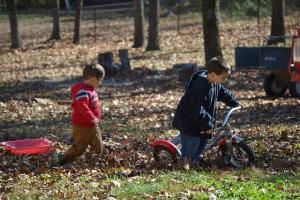
I was ripping out the last of the tomato cages, when the shrieks began.
There are at least ten children on my block and the block across the alley, and they play outdoors loudly whenever it doesn’t rain. You always know school has let out because the laughter and yelling starts– playful yelling, silly yelling, yelling punctuated with bouncing balls and those irritating motorized scooters. This wasn’t that kind of shriek; it was a frightened shriek.
I’d just gotten both hands on the top of the big red cage where my very last tomato plant had just wilted. The frost earlier in the week killed it. I’ll have no more fresh tomatoes until next May now. I must have been feeling ambitious when I put this cage in the ground, because it was hammered in tightly, clinging to the soil with all of its might. I heaved, and heaved, and yanked, and then the cage popped out of the ground all at once. That was when the screaming started, as if I’d just harvested a mandrake.
“MOMMY!” screamed the mandrake. “Mommy! Mommy!!!”
I haven’t had anybody call me “Mommy” for the longest time. My baby is thirteen, and calls me “Mom,” and it makes me feel old.
I’ve wished for another baby to call me “Mommy” for twelve years.
“MOMMY!” came the cry again– not from the tomato cage, of course.
I looked up just in time to see a little blond baby, maybe a year old, running down the sidewalk with no shoes or pants on, disposable diaper drooping nearly to the knees. I love that age– when they walk by launching themselves forward and letting inertia do the rest. What they need is a good rumpus room to launch themselves around, where they can explore and toddle without doing any harm.
I assumed there was a mother or father following the baby, but none appeared. I dropped the tomato cage and ran to investigate.
The baby was making his or her way down the sidewalk to the intersection, and there was no grownup anywhere to be seen.
“Hello there!” I called, running to prevent a catastrophe. “Hey, come here!”
The baby turned course in a wide turn, rather like an airplane circling for landing, just I saw the mandrake. There was a little girl who might have been as old as four, also barefoot, in grubby leggings and a star-covered tunic, sprinting after the baby, screaming.
“It’s okay!” I said, embracing the baby when they crashed into me. “Is this your brother or sister? Are you lost?”
She took a few seconds to catch her breath before she could speak. The baby was, indeed, her brother, and they were indeed lost. She’d been playing with the baby in the umbrella stroller in their yard, which only has fencing on three sides. Suddenly the baby had jumped out of the stroller and made a break for it. She bolted after, and had been running ever since. She didn’t even know what street she was on.
“I think I know where you belong,” I said, recognizing that wispy hair and those light eyes. I asked if she was one of the children who lived in the purple house, with the boy I call the Artful Dodger. That was the right guess.
“I can get you home. I’ll carry the baby so his feet don’t get cut; there’s so much broken glass in that alley!”
The little girl asked if I could carry her too, but I’m not in good enough shape to carry two children at once. I did hold her hand. We got back to the Artful Dodger’s backyard just as the Artful Dodger himself came around the other side, flanked by his older sister. They’d just realized the little ones weren’t where they were supposed to be and started to look. In all, I think there are five Dodgers. They never stand still long enough to be counted.
That was the kind of family I was supposed to have.
At least five children, closely spaced, a new baby coming to distract my attention just as the old baby became a preschooler, and then a grandchild just as the youngest wasn’t a baby anymore. That was what my great-grandmother and grandmother had– my mother has lots of baby-running-down-the-street stories, being the second oldest of seven. I was the oldest of five. My best friend growing up was the oldest of nine. This was the only life I knew. That was the only life I thought possible, except for being a nun. I was considered too ugly and eccentric to get married and too frail to be a nun, so it was presumed I’d be an old maid college professor, and I didn’t want that. I thought it was a miracle from God when I did get married. I thought I’d go right into having six or seven little ones and never having to say goodbye.
It didn’t work out.
I’m forty now, out of time. I grew up knowing how to live with an endless stream of babies underfoot, and I liked it. I don’t know how to be a mother of one who has to say goodbye. I don’t know how to be the person that I am. I only know how to be other people.
The mandrake asked if I’d go and get her stroller, which was across the alley where it had fallen. I did. The Dodgers all thanked me. I said I hoped I’d see them on Halloween so I could admire their costumes.
I came back to the garden, where Sparkles the Disaster Cat had just dropped in– Jimmy’s boy was close behind, bringing his new bottle of soap bubbles. He showed me how he could spin around in a tight circle and the wind would accomplish the rest, spreading rainbow orbs across the lawn of the haunted house.
The shrieks around LaBelle were the right kind– the noisy laughter of children playing everywhere. And the children know they can come to me, and play in the garden, and we have a good visit. It’s not exactly like a family, but it doesn’t feel bad.
I think I’m going to be all right.
Mary Pezzulo is the author of Meditations on the Way of the Cross, The Sorrows and Joys of Mary, and Stumbling into Grace: How We Meet God in Tiny Works of Mercy.













